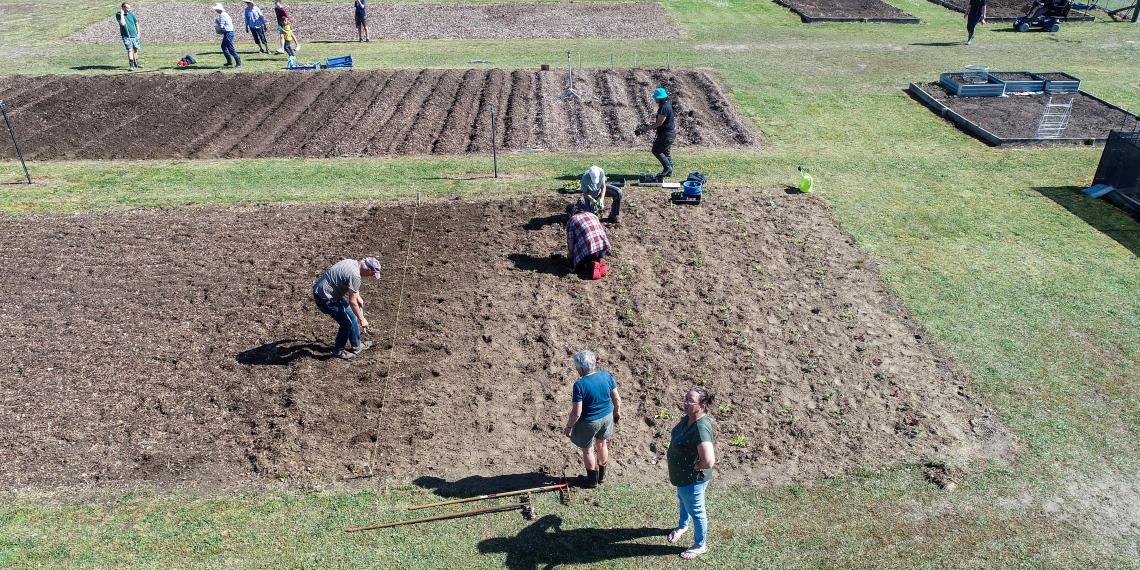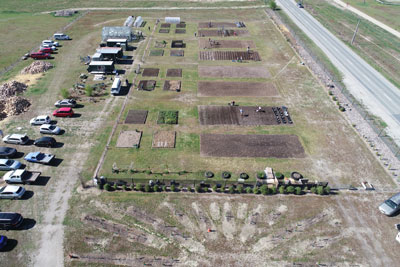You are here
Growing Hope

Te Kai Mākona, The Salvation Army’s new food security framework, has taken root in Alexandra. Early adopters of the new approach, the team were already well down the philosophical change trajectory when they embarked on operational change. But instead of labouring alone, they planted seeds in the good soil of the wider community, and now collaboration is blooming. And with a well-established community garden, sowing love and growing hope is something the Alexandra team specialises in.
Te Kai Mākona is The Salvation Army’s re-imagined approach to food hardship in Aotearoa. Mākona means to be fully satisfied and have everything you need physically, emotionally, spiritually and socially. Our vision is to be places of support and connection, strengthening food security and sovereignty for whānau and communities. Eligibility is no longer part of our practice, but rather the return of agency to individuals and families. It’s a mana-enhancing kaupapa, empowering whānau and individuals to build on the strengths and capacity they already have. The team at Alexandra Salvation Army have worked hard to embed the food support practices of ‘partnering around kai’ and ‘choosing kai’, exhibited by strong collaboration with other agencies and a choice model community foodbank. But it’s the sharing of abundant, nutritious, fresh kai—locally grown by the community in the community and for the community—that’s showcasing the real potential of Te Kai Makona’s ‘growing kai’ food support practice.
Collective benefits
Captains Logan and Suzanne Bathurst already had experience operating a community foodbank in a small town when they arrived in Alexandra in 2019.
 ‘We knew the collective benefits of working together—we could do more and do it better if we collaborated,’ explains Logan. ‘Alexandra had a community foodbank plus a Salvation Army foodbank. We were able to sit down together and combine everything into the Foodbank Trust, with one hub that all agencies and organisations in town have access to.’
‘We knew the collective benefits of working together—we could do more and do it better if we collaborated,’ explains Logan. ‘Alexandra had a community foodbank plus a Salvation Army foodbank. We were able to sit down together and combine everything into the Foodbank Trust, with one hub that all agencies and organisations in town have access to.’
Covid-19 lockdowns provided a foundation of working together that made combining operations relatively smooth, but the shift to a choice model operation came later. And it was having access to Te Kai Mākona resources that sealed the deal.
‘The big thinking was taken out of the equation, which was huge because all we had to do was implement the framework. We invited others to join the kaupapa, explaining that we were wanting to align ourselves with best practice in this space. We had expected some resistance from stakeholders but there wasn’t any. Everyone jumped on board straight away which was exciting. Any problems we had were operational not philosophical. It’s been a huge game-changer for the community,’ says Logan.
Real connection
 Based on Salvation Army property, the Foodbank Trust has a memorandum of understanding with users. ‘The vast majority of social services agencies in town have access in one form or another,’ explains Logan. ‘For us and most of the other agencies it’s about getting food to the people who need it, but food is not the endgame. The shift from eligibility to accessibility leaves room for building connection and exploring what’s underlying the request for food.’
Based on Salvation Army property, the Foodbank Trust has a memorandum of understanding with users. ‘The vast majority of social services agencies in town have access in one form or another,’ explains Logan. ‘For us and most of the other agencies it’s about getting food to the people who need it, but food is not the endgame. The shift from eligibility to accessibility leaves room for building connection and exploring what’s underlying the request for food.’
‘As an officer trying to live out our mission of caring for people, transforming lives and reforming society, the new choice model foodbank provides real opportunity for connection,’ says Suzanne. ‘Recently I went into the foodbank with a woman, and while she shopped we talked about her family, and she asked me about mine—it was normal, real connection. People are more likely to open up now. If we were still packing parcels and handing them over, we’d miss out on that privilege of deep sharing.’
Volunteer Diane Barbara adds, ‘Because people can choose, that awkwardness is gone. You’re still providing a food parcel, but people are empowered to choose what they need, not what we think they should have. And they’re choosing meals. Ironically, people don’t generally take staples like tea, coffee, sugar and flour—the very things we were once packing as essentials. If it were me coming in for a food parcel, I would want to choose because I know what’s in my pantry, just like they do. I love being part of something so positive.’
Planting community
Alexandra Salvation Army’s ‘Eden Garden’ is a well-established community endeavour. Garden Manager Brian Seymour has been making a difference with his green thumb since 2007. Every year in October, an open invitation is given to anyone in the community who wants to come and invest some free time in the annual planting day. Most of the plants are propagated by Brian.
 In the new year, produce is ready for distribution, with the Central Otago growing season running for about 16 weeks before it gets too cold. Every week people come and select what they need, making a small donation towards next year’s planting. Stores of potatoes, pumpkins and marrows last through the winter and supplement the foodbank.
In the new year, produce is ready for distribution, with the Central Otago growing season running for about 16 weeks before it gets too cold. Every week people come and select what they need, making a small donation towards next year’s planting. Stores of potatoes, pumpkins and marrows last through the winter and supplement the foodbank.
Logan reports the results of a survey taken of people accessing the garden produce: ‘We heard stories of people who were struggling to pay doctor’s bills but were still able to eat healthy food because of the community garden. We are so blessed to have this resource to share, especially with the impact of the current cost-of-living crisis. For families to be able to come and grab a bag of vegetables when things are tight is huge.’
Philosophical about The Salvation Army’s role in providing food support, Logan emphasises that the issue of food insecurity in New Zealand needs much wider attention and resourcing. ‘Food insecurity is a big issue across New Zealand, particularly in today’s economic climate. We can do all we can locally to provide food support by encouraging people to come through the centre and have what we always hope will be an empowering and transformative experience, but The Salvation Army will always be the ambulance at the bottom of the cliff—it’s in our DNA to be there. We need others to partner with the likes of our Social Policy and Parliamentary Unit (SPPU) to drive change that addresses the causes of food insecurity and to build a fence at the top of the cliff.’
Growing hope in the hearts of struggling whānau and individuals is hard work, but the team in Alexandra continue to dig deep and sow with love so that those in the most need reap the benefits.